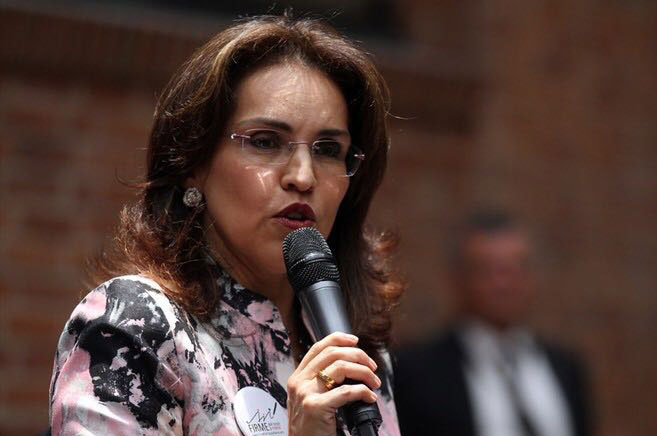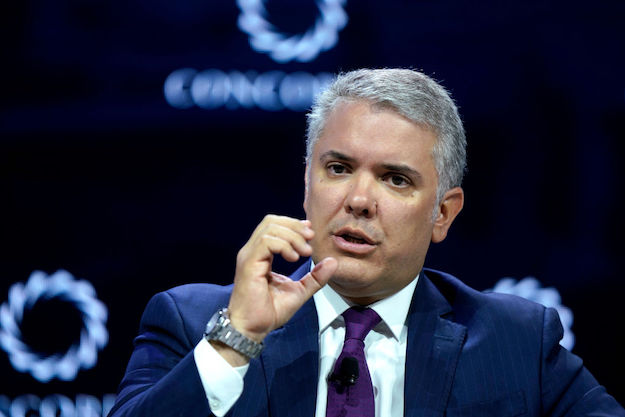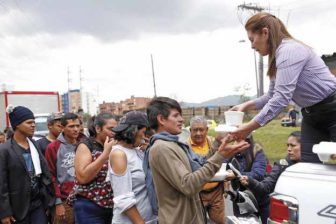With negotiators hurriedly trying to salvage Colombia’s rejected peace deal, one legislator is stirring up conflict of a different sort. For more than a year, Viviane Morales has been pushing a bill that, if passed by Congress and approved in a referendum, would prevent anyone not in a heterosexual marriage from adopting children. Not surprisingly, LGBT activists are among those crying foul.
“This is a discriminatory referendum because it takes the opportunity to adopt away from same-sex couples, and also prevents single heterosexual people from adopting,” Mauricio Albarracín, a lawyer and LGBT rights activist, told AQ. “Congress has never approved a referendum like this. It would be the first time in history that a referendum to deprive a group of a right is approved.”
But the proposal is gaining support.
Morales, a senator who briefly served as Colombia’s attorney general in 2011-2012, in March announced that she had collected over 2.1 million signatures from supporters of the bill, enough to propel it to a preliminary vote by a Senate committee. In September, committee members from across the political spectrum voted to pass the proposal on to the full Senate.
Morales did not respond to requests for comment, but has maintained publicly that the referendum “is not discriminatory” and is, in her view, a vehicle to guarantee rights: the Colombian people’s right to have a say in policies and “the right of children to have a family.”
But Colombia’s highest court, through a November 2015 ruling, has already established that same-sex couples have the right to adopt. The same court would have to approve Morales’ referendum proposal even if Congress passes it. Senator Claudia López, an out lesbian who has emerged as one of the referendum’s chief opponents and was one of the three members of the Senate committee who voted against the bill, told AQ that she expects the referendum to make it through Congress, but to fail when it reaches the court.
“The referendum has no chance of happening because it is openly discriminatory and unconstitutional, and (its supporters) know this,” López said of the bill and its backers. “What they’re doing is promoting their political campaigns and causes. It serves their electoral ambitions.”
Indeed, Morales’ and other politicians’ support for restricting adoption rights may reflect the growing political clout of Colombia’s conservative evangelical community, which some observers believe helped turn the tide against the peace vote in October. In Morales’ case, her appeal to this bloc – and to the over two million Colombians who signed her petition – could make her a valuable political ally. In a recent op-ed for Spanish newspaper El País, Colombian political analyst Ariel Ávila suggested that Vice President Germán Vargas Lleras could be considering Morales as a running mate for the presidential race in 2018, in which he is considered among the early front-runners.
Morales hasn’t tried to hide the influence of evangelical churches in her push for the referendum. “More than powerful, they’re massive,” she said during an interview for Caracol Radio in October. “Churches are filling up more every Sunday.” But Morales’ blending of religion and politics amounts to more than political expediency. When she first entered Congress in 1991, she did so as a member of the Christian Union, Colombia’s first Christian political party, and she authored her first religious liberty law during her first term in the Lower House.
As a legislator, though, Morales can be hard to pin down. She has been an advocate both for religious minorities and for women throughout her career. She authored Colombia’s quota law, which was passed in 2000 and requires that 30 percent of top government positions be filled by women. She has even introduced legislation in favor of drug legalization.
“She used to be much more liberal than she is now,” Albarracín told AQ, adding that Morales’ referendum aims to take advantage of a strengthening conservative movement not only in Latin America, but in parts of Europe and the United States.
Opponents of Morales’ referendum are quick to point out that only half of Colombians fit within Morales’ definition of family – that is, one headed by a married heterosexual male and female. But adoption by same-sex couples isn’t widely supported in Colombia. One survey of Bogotá residents conducted in 2014 by the Universidad de La Sabana showed that 70 percent disapproved of the idea.
After the defeat of the government’s peace deal in October, political momentum seems to be with the conservative forces that backed former President Álvaro Uribe’s “No” campaign. Similar forces support Morales’ proposal, but whether that portends well for her political future is unclear; during her term as attorney general, Morales drew significant criticism from Uribe, who accused her of spearheading a defamation campaign against him as she led efforts to jail several of his close collaborators.
Politics and religion often do make strange bedfellows.
—
O’Boyle is an editor at AQ









